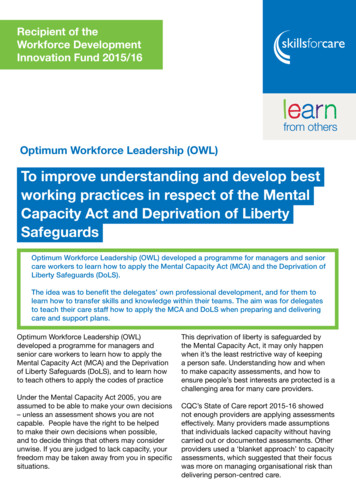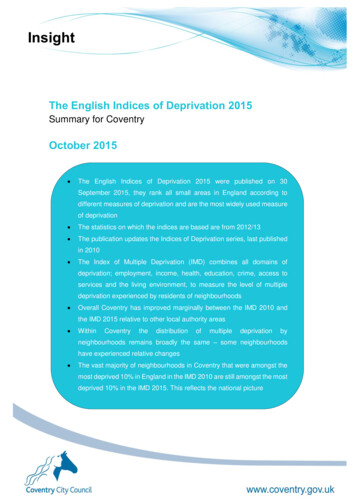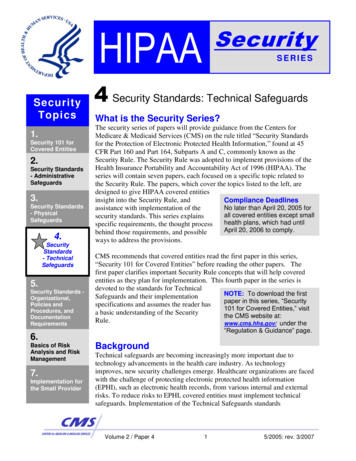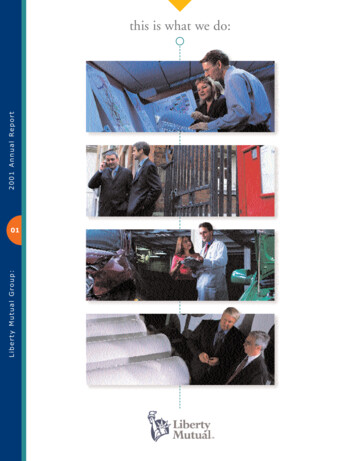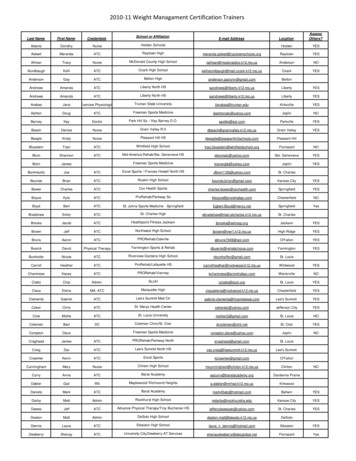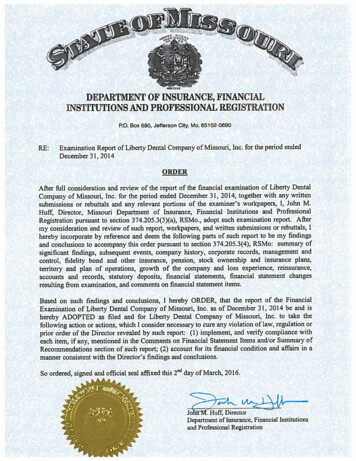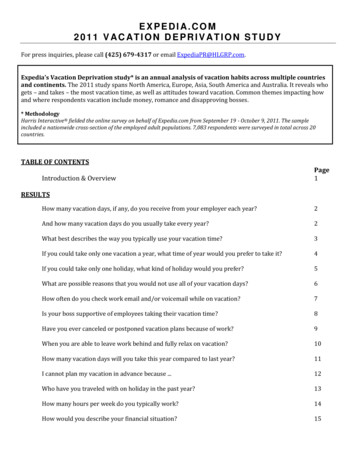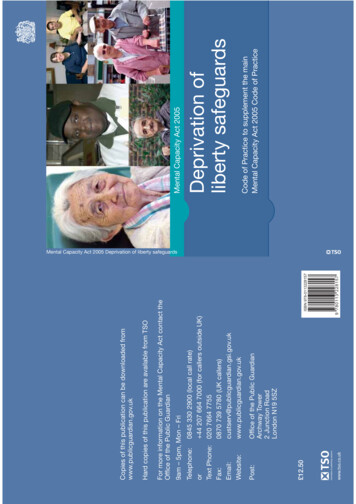
Transcription
Office of the Public GuardianArchway Tower2 Junction RoadLondon N19 5SZPost:XXX UTP DP VL 12.500845 330 2900 (local call rate) 44 207 664 7000 (for callers outside UK)020 7664 77550870 739 5780 (UK icguardian.gov.ukTelephone:orText Phone:Fax:Email:Website:9am – 5pm, Mon – Fri9 780113 228157ISBN 978-0113228157For more information on the Mental Capacity Act contact theOffice of the Public GuardianHard copies of this publication are available from TSOCopies of this publication can be downloaded fromwww.publicguardian.gov.ukMental Capacity Act 2005 Deprivation of liberty safeguardsCode of Practice to supplement the mainMental Capacity Act 2005 Code of PracticeDeprivation ofliberty safeguardsMental Capacity Act 2005
Ministry of JusticeMental Capacity Act 2005Deprivation ofliberty safeguardsCode of Practice to supplement the mainMental Capacity Act 2005 Code of PracticeIssued by the Lord Chancellor on 26 August 2008 inaccordance with sections 42 and 43 of the ActLondon: TSO
Published by TSO (The Stationery Office) and available from:Onlinewww.tsoshop.co.ukMail,Telephone, Fax & E-mailTSOPO Box 29, Norwich, NR3 1GNTelephone orders/General enquiries: 0870 600 5522Fax orders: 0870 600 5533E-mail: customer.services@tso.co.ukTextphone 0870 240 3701TSO Shops16 Arthur Street, Belfast BT1 4GD028 9023 8451 Fax 028 9023 540171 Lothian Road, Edinburgh EH3 9AZ0870 606 5566 Fax 0870 606 5588TSO@Blackwell and other Accredited Agents Crown Copyright 2008First published 2008ISBN 978 0 11 3228157Published by The Stationery Office on behalf of the Ministry of Justice.Printed in the United Kingdom for The Stationery Office.You may re-use this document/publication (not including the Royal Arms and otherdepartmental or agency logos) free of charge in any format or medium. You mustre-use it accurately and not in a misleading context. The material must be acknowledged as Crown copyright and you must give the title of the source document/publication. Where we have identified any third party copyright material you will need toobtain permission from the copyright holders concerned.This document/publication can also be viewed on our website at:www.publicguardian.gov.ukAny enquiries regarding this document/publication should be sent to us at:Office of the Public GuardianArchway Tower2 Junction RoadLondon N19 5SZ0845 330 2900
Foreword by Ivan Lewis andEdwina Hart MBEIvan Lewis,Parliamentary UnderSecretary of State,Department of HealthEdwina Hart AM MBE,Minister for Health andSocial Services, WelshAssembly GovernmentThe Mental Capacity Act 2005 (‘the Act’) provides a statutory framework foracting and making decisions on behalf of individuals who lack the mentalcapacity to do so for themselves. It introduced a number of laws to protectthese individuals and ensure that they are given every chance to makedecisions for themselves. The Act came into force in October 2007.The Government has added new provisions to the Act: the deprivation ofliberty safeguards. The safeguards focus on some of the most vulnerablepeople in our society: those who for their own safety and in their own bestinterests need to be accommodated under care and treatment regimesthat may have the effect of depriving them of their liberty, but who lack thecapacity to consent.The deprivation of a person’s liberty is a very serious matter and should nothappen unless it is absolutely necessary, and in the best interests of theperson concerned. That is why the safeguards have been created: to ensurethat any decision to deprive someone of their liberty is made following definedprocesses and in consultation with specific authorities.
The new provisions in the Act set out the legal framework of the deprivationof liberty safeguards. This Code of Practice is formally issued by the LordChancellor as a Code of Practice under the Mental Capacity Act 2005. Itprovides guidance and information for those implementing the deprivation ofliberty safeguards legislation on a daily basis. In some cases, this will be paidstaff, in others those who have been appointed in law to represent individualswho lack capacity to make decisions for themselves (such as deputies ordonees of a Lasting Power of Attorney).Because of this broad audience, the Code of Practice has been written soas to make it as user-friendly as possible – like the main Mental Capacity Act2005 Code of Practice, issued in April 2007. We are grateful to all those whocommented on earlier drafts of the Code to help it achieve that goal.Ivan LewisEdwina Hart
IntroductionThe Mental Capacity Act 2005 (‘the Act’), covering England and Wales,provides a statutory framework for acting and making decisions on behalf ofpeople who lack the capacity to make those decisions for themselves. Thesecan be small decisions – such as what clothes to wear – or major decisions,such as where to live.In some cases, people lack the capacity to consent to particular treatment orcare that is recognised by others as being in their best interests, or which willprotect them from harm. Where this care might involve depriving vulnerablepeople of their liberty in either a hospital or a care home, extra safeguardshave been introduced, in law, to protect their rights and ensure that the careor treatment they receive is in their best interests.This Code of Practice helps explain how to identify when a person is, or is atrisk of, being deprived of their liberty and how deprivation of liberty may beavoided. It also explains the safeguards that have been put in place to ensurethat deprivation of liberty, where it does need to occur, has a lawful basis. Inaddition, it provides guidance on what someone should do if they suspectthat a person who lacks capacity is being deprived of their liberty unlawfully.These safeguards are an important way of protecting the rights of manyvulnerable people and should not be viewed negatively. Depriving someoneof their liberty can be a necessary requirement in order to provide effectivecare or treatment. By following the criteria set out in the safeguards, andexplained in this Code of Practice, the decision to deprive someone of theirliberty can be made lawfully and properly.How does this Code of Practice relate to the main MentalCapacity Act 2005 Code of Practice?This document adds to the guidance in the main Mental Capacity Act 2005Code of Practice (‘the main Code’), which was issued in April 2007, andshould be used in conjunction with the main Code. It focuses specifically onthe deprivation of liberty safeguards added to the Act. These can be found insections 4A and 4B of, and Schedules A1 and 1A to, the Act.1
The Mental Capacity Act – Deprivation of liberty safeguardsThough these safeguards were mentioned in the main Code (particularly inchapters 6 and 13), they were not covered in any detail. That was because, atthe time the main Code was published, the deprivation of liberty safeguardswere still going through the Parliamentary process as part of the MentalHealth Bill.1Although the main Code does not cover the deprivation of liberty safeguards,the principles of that Code, and much of its content, are directly relevant tothe deprivation of liberty safeguards. It is important that both the Act and themain Code are adhered to whenever capacity and best interests issues, andthe deprivation of liberty safeguards, are being considered. The deprivation ofliberty safeguards are in addition to, and do not replace, other safeguards inthe Act.How should this Code of Practice be used?This Code of Practice provides guidance to anyone working with and/orcaring for adults who lack capacity, but it particularly focuses on those whohave a ‘duty of care’ to a person who lacks the capacity to consent to thecare or treatment that is being provided, where that care or treatment mayinclude the need to deprive the person of their liberty. This Code of Practiceis also intended to provide information for people who are, or could become,subject to the deprivation of liberty safeguards, and for their families, friendsand carers, as well as for anyone who believes that someone is beingdeprived of their liberty unlawfully.In this Code of Practice, as throughout the main Code, references to ‘lackof capacity’ refer to the capacity to make a particular decision at the timeit needs to be made. In the context of the deprivation of liberty safeguards,the capacity is specifically the capacity to decide whether or not to consentto care or treatment which involves being kept in a hospital or care homein circumstances that amount to a deprivation of liberty, at the time thatdecision needs to be made.What is the legal status of this Code of Practice?As with the main Code, this Code of Practice is published by the LordChancellor, under sections 42 and 43 of the Mental Capacity Act 2005. Thepurpose of the main Code is to provide guidance and information about howthe Act works in practice.12The Mental Health Bill was used as a vehicle to amend the Mental Capacity Act 2005 inorder to introduce the deprivation of liberty safeguards. The Bill became the Mental HealthAct 2007 following completion of its Parliamentary passage.
The Mental Capacity Act – Deprivation of liberty safeguardsBoth this Code and the main Code have statutory force, which means thatcertain people are under a legal duty to have regard to them. More detailscan be found in the Introduction to the main Code, which explains the legalstatus of the Code and who should have regard to it.IntroductionIn addition to those for whom the main Code is intended, this Code ofPractice specifically focuses on providing guidance for:s people exercising functions relating to the deprivation of liberty safeguards,ands people acting as a relevant person’s representative2 under the deprivationof liberty safeguards (see chapter 7).Scenarios used in this Code of PracticeThis Code of Practice includes boxes within the main text containingscenarios, using imaginary characters and situations. These are intended tohelp illustrate what is meant in the main text. They should not in any way betaken as templates for decisions that need to be made in similar situations.Decisions must always be made on the facts of each individual case.Alternative formats and further informationThis Code of Practice is also available in Welsh and can be made available inother formats on request.2A ‘relevant person’ is a person who is, or may become, deprived of their liberty inaccordance with the deprivation of liberty safeguards.3
Contents1.What are the deprivation of liberty safeguards and why were theyintroduced?9What are the deprivation of liberty safeguards?9Who is covered by these safeguards?11When can someone be deprived of their liberty?12Are there any cultural considerations in implementing the safeguards? 132.3.Where do the safeguards apply?14How do the safeguards relate to the rest of the Mental CapacityAct 2005?14What is deprivation of liberty?16What does case law say to date?16How can deprivation of liberty be identified?18What practical steps can be taken to reduce the risk of unlawfuldeprivation of liberty occurring?18What does the Act mean by ‘restraint’?19How does the use of restraint apply within a hospital or whentaking someone to a hospital or a care home?20Examples of case law21How and when can deprivation of liberty be applied for andauthorised?28How, in summary, can deprivation of liberty be authorised?28How should managing authorities decide whether to apply for anauthorisation?30What is the application process?31Who should be informed that an application has been made?34What action does the supervisory body need to take when itreceives an application for authorisation?34Can an application for authorisation be made in advance?35What happens when the managing authority and the supervisorybody are the same organisation?35When should an IMCA be instructed?365
The Mental Capacity Act – Deprivation of liberty safeguards4.5.6.7.6What is the assessment process for a standard authorisation ofdeprivation of liberty?39What assessments are required before giving a standardauthorisation?39When must assessments take place?41How should assessors be selected?41What is the assessment process?44What guidelines are there relating to the work of assessors?60What should happen once the assessments are complete?61What action should the supervisory body take if the assessmentsconclude that the person meets the requirements for authorisation?61How long can an authorisation last?63What restrictions exist on authorisations?63Can a person be moved to a different location under a standardauthorisation?64What happens if an assessment concludes that one of therequirements is not met?64What are the responsibilities of the managing authority and thecommissioners of care if a request for an authorisation isturned down?65When can urgent authorisations of deprivation of liberty be given? 67When can an urgent authorisation be given?67What records should be kept about urgent authorisations?69Who should be consulted before giving an urgent authorisation?69Can a person be moved into care under an urgent authorisation?71What happens at the end of an urgent authorisation period?72How and when can an urgent authorisation be extended?73What is the role of the relevant person’s representative?76What is the role of the relevant person’s representative?76How should managing authorities work with the relevant person’srepresentative?77Who can be the relevant person’s representative?77When should the relevant person’s representative be identified?78How should the relevant person’s representative be selected?79How should the relevant person’s representative be appointed?81
The Mental Capacity Act – Deprivation of liberty safeguards8.How should the work of the relevant person’s representativebe supported and monitored?82When can the appointment of the relevant person’s representative beterminated?83What happens when there is no relevant person’s representativeavailable?84When should an IMCA be instructed?84When should an authorisation be reviewed and what happenswhen it ends?86When should a standard authorisation be reviewed?86What happens when a review is going to take place?87How should standard authorisations be reviewed?88What happens if any of the requirements are not met?90ContentsIs a review necessary when the relevant person’s capacity fluctuates? 919.What happens when an authorisation ends?93What happens if someone thinks a person is being deprived oftheir liberty without authorisation?94What action should someone take if they think a person is beingdeprived of their liberty without authorisation?94What happens if somebody informs the supervisory body directlythat they think a person is being deprived of their liberty withoutauthorisation?96How will the assessment of unlawful deprivation of liberty beconducted?96What happens once the assessment has been conducted?9710. What is the Court of Protection and when can people apply to it?98When can people apply to the Court of Protection about thedeprivation of liberty safeguards and who can apply?98How should people apply to the Court of Protection?99What orders can the Court of Protection make?100What is the role of the Court of Protection in respect of peoplelacking capacity who are deprived of their liberty in settingsother than hospitals or care homes?100Is legal aid available to support applications to the Court ofProtection in deprivation of liberty safeguards cases?1017
The Mental Capacity Act – Deprivation of liberty safeguards11. How will the safeguards be monitored?102Who will monitor the safeguards?102What will the inspection bodies do and what powers will they have?102ChecklistsKey points for care homes and hospitals (managing authorities)104104Key points for local authorities and NHS bodies (supervisory bodies) 105Key points for managing authorities and supervisory bodiesAnnexes107Annex 1 – Overview of the deprivation of liberty safeguards process107Annex 2 – What should a managing authority consider beforeapplying for authorisation of deprivation of liberty?108Annex 3 – Supervisory body action on receipt of a request fora standard deprivation of liberty authorisation or to determinewhether there is an unauthorised deprivation of liberty110Annex 4 – Standard authorisation review process112Key words and phrases used in the Code of Practice8106114
1What are the deprivation of libertysafeguards and why were theyintroduced?The deprivation of liberty safeguards were introduced to provide a legalframework around the deprivation of liberty. Specifically, they were introducedto prevent breaches of the European Convention on Human Rights (ECHR)such as the one identified by the judgment of the European Court of HumanRights (ECtHR) in the case of HL v the United Kingdom3 (commonly referredto as the ‘Bournewood’ judgment). The case concerned an autistic man(HL) with a learning disability, who lacked the capacity to decide whether heshould be admitted to hospital for specific treatment. He was admitted onan informal basis under common law in his best interests, but this decisionwas challenged by HL’s carers. In its judgment, the ECtHR held that thisadmission constituted a deprivation of HL’s liberty and, further, that:s the deprivation of liberty had not been in accordance with ‘a procedureprescribed by law’ and was, therefore, in breach of Article 5(1) of the ECHR,ands there had been a contravention of Article 5(4) of the ECHR because HL hadno means of applying quickly to a court to see if the deprivation of libertywas lawful.To prevent further similar breaches of the ECHR, the Mental CapacityAct 2005 has been amended to provide safeguards for people who lackcapacity specifically to consent to treatment or care in either a hospitalor a care home4 that, in their own best interests, can only be provided incircumstances that amount to a deprivation of liberty, and where detentionunder the Mental Health Act 1983 is not appropriate for the person at thattime. These safeguards are referred to in this Code of Practice as ‘deprivationof liberty safeguards’.What are the deprivation of liberty safeguards?1.134The deprivation of liberty safeguards provide legal protection forthose vulnerable people who are, or may become, deprived of theirliberty within the meaning of Article 5 of the ECHR in a hospital or carehome, whether placed under public or private arrangements. Theydo not apply to people detained under the Mental Health Act 1983.The safeguards exist to provide a proper legal process and suitable(2004) Application No: 00045508/99Throughout this document, the term ‘care home’ means a care home registered under theCare Standards Act 2000.9
The Mental Capacity Act – Deprivation of liberty safeguardsprotection in those circumstances where deprivation of liberty appearsto be unavoidable, in a person’s own best interests.1.2Every effort should be made, in both commissioning and providing careor treatment, to prevent deprivation of liberty. If deprivation of libertycannot be avoided, it should be for no longer than is necessary.1.3The safeguards provide for deprivation of liberty to be made lawfulthrough ‘standard’ or ‘urgent’ authorisation processes. Theseprocesses are designed to prevent arbitrary decisions to deprive aperson of liberty and give a right to challenge deprivation of libertyauthorisations.1.4The deprivation of liberty safeguards mean that a ‘managing authority’(i.e. the relevant hospital or care home – see paragraph 3.1) must seekauthorisation from a ‘supervisory body’ in order to be able lawfully todeprive someone of their liberty. Before giving such an authorisation,the supervisory body must be satisfied that the person has a mentaldisorder5 and lacks capacity to decide about their residence or treatment.The supervisory body could be a primary care trust, a local authority,Welsh Ministers or a local health board (LHB) (see paragraph 3.3).1.5A decision as to whether or not deprivation of liberty arises willdepend on all the circumstances of the case (as explained more fullyin chapter 2). It is neither necessary nor appropriate to apply for adeprivation of liberty authorisation for everyone who is in hospital ora care home simply because the person concerned lacks capacity todecide whether or not they should be there. In deciding whether ornot an application is necessary, a managing authority should carefullyconsider whether any restrictions that are, or will be, needed to provideongoing care or treatment amount to a deprivation of liberty whenlooked at together.510As defined in section 1 of the Mental Health Act 1983, a mental disorder is any disorderor disability of the mind, apart from dependence on alcohol and drugs. This includesall learning disabilities. The distinction in the Mental Health Act 1983 between learningdisabilities depending on whether or not they are associated with abnormally aggressive orseriously irresponsible behaviour is not relevant.
The Mental Capacity Act – Deprivation of liberty safeguards1.6The deprivation of liberty safeguards cover:s how an application for authorisation should be applied fors how an application for authorisation should be assesseds the requirements that must be fulfilled for an authorisation to begivens how an authorisation should be revieweds what support and representation must be provided for people whoare subject to an authorisation, andChapter 1What are thedeprivationof libertysafeguards andwhy were theyintroduced?s how people can challenge authorisations.Who is covered by these safeguards?1.7The safeguards apply to people in England and Wales who have amental disorder and lack capacity to consent to the arrangementsmade for their care or treatment, but for whom receiving care ortreatment in circumstances that amount to a deprivation of libertymay be necessary to protect them from harm and appears to be intheir best interests. A large number of these people will be those withsignificant learning disabilities, or older people who have dementiaor some similar disability, but they can also include those who havecertain other neurological conditions (for example as a result of abrain injury).1.8In order to come within the scope of a deprivation of libertyauthorisation, a person must be detained in a hospital or care home,for the purpose of being given care or treatment in circumstances thatamount to a deprivation of liberty. The authorisation must relate to theindividual concerned and to the hospital or care home in which they aredetained.1.9For the purposes of Article 5 of the ECHR, there is no distinction inprinciple between depriving a person who lacks capacity of theirliberty for the purpose of treating them for a physical condition, anddepriving them of their liberty for treatment of a mental disorder. Therewill therefore be occasions when people who lack capacity to consentto admission are taken to hospital for treatment of physical illnesses orinjuries, and then need to be cared for in circumstances that amount toa deprivation of liberty. In these circumstances, a deprivation of libertyauthorisation must be applied for. Consequently, this Code of Practicemust be followed and applied in acute hospital settings as well as carehomes and mental health units.11
The Mental Capacity Act – Deprivation of liberty safeguards1.10It is important to bear in mind that, while the deprivation of libertymight be for the purpose of giving a person treatment, a deprivationof liberty authorisation does not itself authorise treatment. Treatmentthat is proposed following authorisation of deprivation of liberty mayonly be given with the person’s consent (if they have capacity to makethe decision) or in accordance with the wider provisions of the MentalCapacity Act 2005. More details of this are contained in paragraphs5.10 to 5.13 of this Code.1.11The safeguards cannot apply to people while they are detained inhospital under the Mental Health Act 1983. The safeguards can,however, apply to a person who has previously been detained inhospital under the Mental Health Act 1983. There are other cases inwhich people who are – or could be – subject to the Mental HealthAct 1983 will not meet the eligibility requirement for the safeguards.Chapter 13 of the main Code contains guidance on the relationshipbetween the Mental Capacity Act 2005 and the Mental Health Act1983 generally, as does the Code of Practice to the Mental HealthAct 1983 itself. Paragraphs 4.40 to 4.57 of the present Code explainthe relationship of the deprivation of liberty safeguards to the MentalHealth Act 1983, and in particular how to assess if a person is eligibleto be deprived of their liberty under the safeguards.1.12The safeguards relate only to people aged 18 and over. If the issueof depriving a person under the age of 18 of their liberty arises, othersafeguards must be considered – such as the existing powers of thecourt, particularly those under section 25 of the Children Act 1989, oruse of the Mental Health Act 1983.When can someone be deprived of their liberty?1.13Depriving someone who lacks the capacity to consent to thearrangements made for their care or treatment of their liberty is aserious matter, and the decision to do so should not be taken lightly.The deprivation of liberty safeguards make it clear that a person mayonly be deprived of their liberty:s in their own best interests to protect them from harms if it is a proportionate response to the likelihood and seriousness ofthe harm, ands if there is no less restrictive alternative.12
The Mental Capacity Act – Deprivation of liberty safeguards1.14Under no circumstances must deprivation of liberty be used as aform of punishment, or for the convenience of professionals, carersor anyone else. Deprivation of liberty should not be extended dueto delays in moving people between care or treatment settings, forexample when somebody awaits discharge after completing a periodof hospital treatment.Are there any cultural considerations in implementing thesafeguards?1.15The deprivation of liberty safeguards should not impact in anydifferent way on different racial or ethnic groups, and care shouldbe taken to ensure that the provisions are not operated in a mannerthat discriminates against particular racial or ethnic groups. It is upto managing authorities and supervisory bodies to ensure that theirstaff are aware of their responsibilities in this regard and of the need toensure that the safeguards are operated fairly and equitably.1.16Assessors who carry out deprivation of liberty assessments to helpdecide whether a person should be deprived of their liberty (seechapter 4) should have the necessary skills and experience to takeaccount of people’s diverse backgrounds. Accordingly, they will needto have an understanding of, and respect for, the background of therelevant person. Supervisory bodies must take these factors intoaccount when appointing assessors and must seek to appoint themost suitable available person for each case.1.17Interpreters should be available, where necessary, to help assessorsto communicate not only with the relevant person but also with peoplewith an interest in their care and treatment. An interpreter should besuitably qualified and experienced to enable them to provide effectivelanguage and communication support in the particular case concerned,and to offer appropriate assistance to the assessors involved.Information should be made available in other languages whererelevant.1.18Any decision about the instruction of Independent Mental CapacityAdvocates (see paragraphs 3.22 to 3.28) or relevant person’srepresentatives (see chapter 7) should take account of the cultural,national, racial or ethnic background of the relevant person.Chapter 1What are thedeprivationof libertysafeguards andwhy were theyintroduced?13
The Mental Capacity Act – Deprivation of liberty safeguardsWhere do the safeguards apply?1.19Although the Bournewood judgment was specifically about a patientwho lacked capacity to consent to admission to hospital for mentalhealth treatment, the judgment has wider implications that extend topeople who lack capacity and who might be deprived of their libertyeither in a hospital or in a care home.1.20It will only be lawful to deprive somebody of their liberty elsewhere (forexample, in their own home, in supported living arrangements otherthan in a care home, or in a day centre) when following an order of theCourt of Protection on a personal welfare matter. In such a case, theCourt of Protection order itself provides a legal basis for the deprivationof liberty. This means that a separate deprivation of liberty authorisationunder the processes set out in this Code of Practice is not required.More information about applying to the Court of Protection regardingpersonal welfare matters is given in chapter 10.How do the safeguards apply to privately arranged care or treatment?1.21Under the Human Rights Act 1998, the duty to act in accordancewith the ECHR applies only to public authorities. However, all statesthat have signed up to the ECHR are obliged to make sure that therights set out in the ECHR apply to all of their citizens. The MentalCapacity Act 2005 therefore makes it clear that the deprivation ofliberty safeguards apply to both publicly and privately arranged care ortreatment.How do the safeguards relate to the rest of the MentalCapacity Act 2005?1.22The deprivation of liberty safeguards are in addition to, and do notreplace, other safeguards in the Mental Capacity Act 2005. This meansthat decisions made, and actions taken, for a person who is subject toa deprivation of liberty authorisation must fulfil the requirements of theAct in the same way as for any other person. In particular, any actiontaken under the deprivation of liberty safeguards must be in line withthe principles of the Act:s A person must be assumed to have capacity to make a decisionunless
Mental Capacity Act 2005 Deprivation of liberty safeguards Code of Practice to supplement the main Mental Capacity Act 2005 Code of Practice ISBN 978-0113228157 9 7 8 0 1 1 3 2 2 8 1 5 7 Copies of this publication can be downloaded from www.publicguardian.gov.uk Hard copies of this publication are available from TSO For more information on the Mental Capacity Act contact the Office of the .
